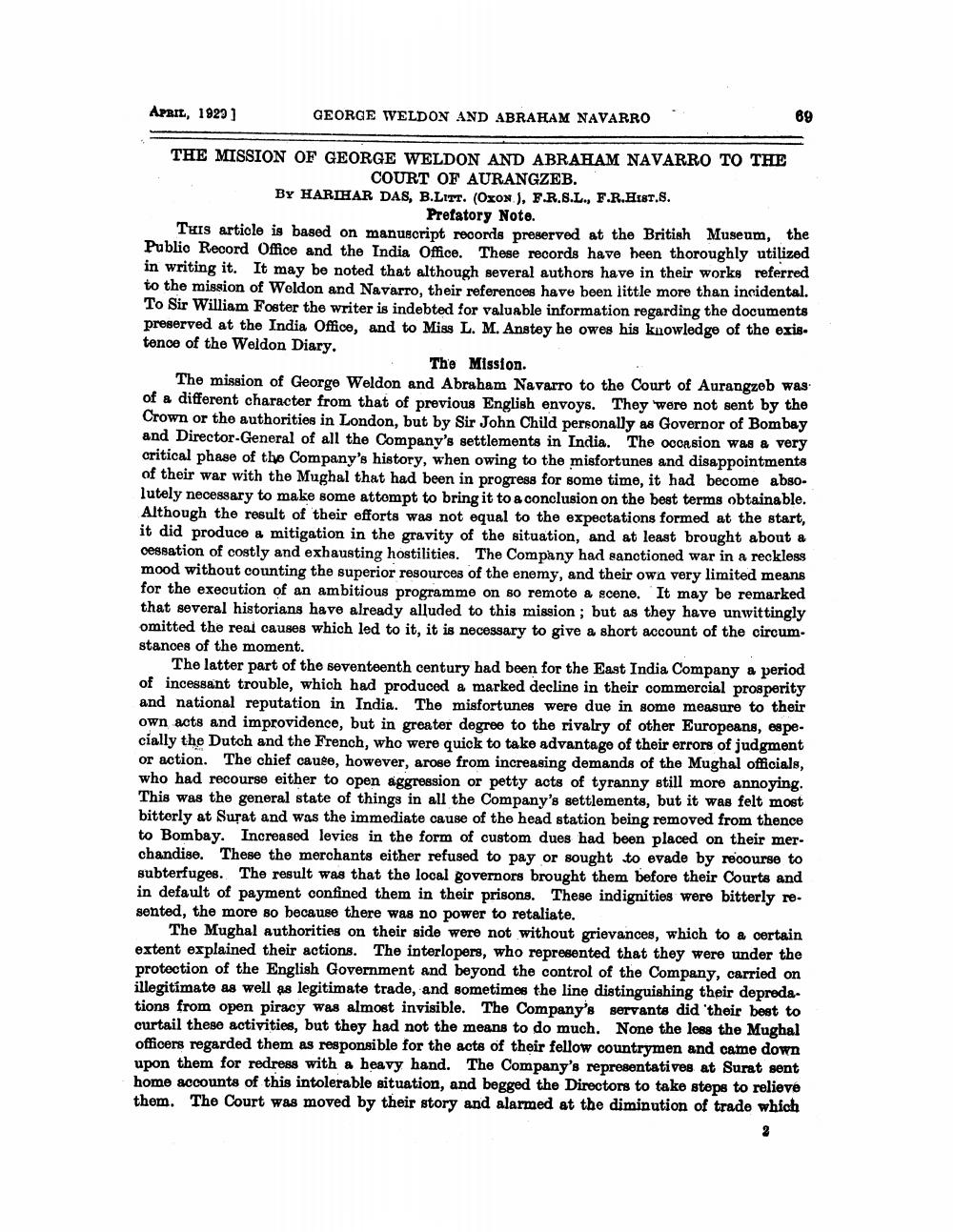________________
APRIL, 1929 ]
GEORGE WELDON AND ABRAHAM NAVARRO
69
THE MISSION OF GEORGE WELDON AND ABRAHAM NAVARRO TO THE
COURT OF AURANGZEB. BY HARIHAR DAS, B.LITT. (Oxon), F.R.S.L., F.R.Hist.S.
Prefatory Note. Turs article is based on manuscript records preserved at the British Museum, the Publio Record Office and the India Office. These records have been thoroughly utilized in writing it. It may be noted that although several authors have in their works referred to the mission of Weldon and Navarro, their references have been little more than incidental. To Sir William Foster the writer is indebted for valuable information regarding the documents preserved at the India Office, and to Miss L. M. Anstey he owes his knowledge of the exis. tence of the Weldon Diary.
The Mission. The mission of George Weldon and Abraham Navarro to the Court of Aurangzeb was. of a different character from that of previous English envoys. They were not sent by the Crown or the authorities in London, but by Sir John Child personally as Governor of Bombay and Director-General of all the Company's settlements in India. The occasion was a very critical phase of the Company's history, when owing to the misfortunes and disappointments of their war with the Mughal that had been in progress for some time, it had become absolutely necessary to make some attompt to bring it to a conclusion on the best terms obtainable. Although the result of their efforts was not equal to the expectations formed at the start, it did produce a mitigation in the gravity of the situation, and at least brought about a cessation of costly and exhausting hostilities. The Company had sanctioned war in a reckless mood without counting the superior resources of the enemy, and their own very limited means for the execution of an ambitious programme on so remote a scene. It may be remarked that several historians have already alluded to this mission; but as they have unwittingly omitted the real causes which led to it, it is necessary to give a short account of the circumstances of the moment.
The latter part of the seventeenth century had been for the East India Company a period of incessant trouble, which had produced a marked decline in their commercial prosperity and national reputation in India. The misfortunes were due in some measure to their own acts and improvidence, but in greater degree to the rivalry of other Europeans, especially the Dutch and the French, who were quick to take advantage of their errors of judgment or action. The chief cause, however, arose from increasing demands of the Mughal officials, who had recourse either to open aggression or petty acts of tyranny still more annoying. This was the general state of things in all the Company's settlements, but it was felt most bitterly at Surat and was the immediate cause of the head station being removed from thence to Bombay. Increased levics in the form of custom dues had been placed on their mer. chandise. These the merchants either refused to pay or sought to evade by recourse to subterfuges. The result was that the local governors brought them before their Courts and in default of payment confined them in their prisons. These indignities were bitterly resented, the more so because there was no power to retaliate.
The Mughal authorities on their side were not without grievances, which to a certain extent explained their actions. The interlopers, who represented that they were under the protection of the English Government and beyond the control of the Company, carried on illegitimate as well as legitimate trade, and sometimes the line distinguishing their depredations from open piracy was almost invisible. The Company's servants did 'their best to curtail these activities, but they had not the means to do much. None the less the Mughal officers regarded them as responsible for the acts of their fellow countrymen and came down upon them for redress with a heavy hand. The Company's representatives at Surat sent home accounts of this intolerable situation, and begged the Directors to take steps to relieve them. The Court was moved by their story and alarmed at the diminution of trade which




